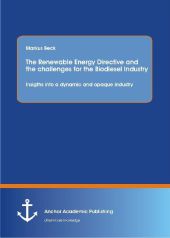 Neuerscheinungen 2013Stand: 2020-01-07 |
Schnellsuche
ISBN/Stichwort/Autor
|
Herderstraße 10
10625 Berlin
Tel.: 030 315 714 16
Fax 030 315 714 14
info@buchspektrum.de |

Markus Beck
The Renewable Energy Directive and the challenges for the Biodiesel Industry: Insigths into a dynamic and opaque industr
1., Aufl. 2013. 125 S. 50 Abb. 220 mm
Verlag/Jahr: ANCHOR ACADEMIC PUBLISHING 2013
ISBN: 3-9548906-5-8 (3954890658)
Neue ISBN: 978-3-9548906-5-1 (9783954890651)
Preis und Lieferzeit: Bitte klicken
In response to climate change, and unsustainable energy consumption, the European Parliament launched a climate and energy package in 2009. This included the 20:20:20 Energy Strategy whose aim was to decrease the effects of climate change, in particular by lowering greenhouse gas (GHG) emissions by 2020. This 10-year action plan proposes measures to increase the current efficiency levels of energy use, and raises the share of renewable energies within the energy mix for all 27 EU Member States. As a result, the increased use of biofuels, particularly in the transport sector, will be an important part of a more complex framework. Although, biofuels represent only two per cent of total transport fuels used, political incentives, technology, and efficiency improvements could increase this by eight per cent in Europe by 2020.
In line with the 20:20:20 Strategy, the Renewable Energy Directive (RED) was introduced to regulate the overall biofuel market, amongst others. Based on the RED s definition of sustainability, different certification schemes emerged, aimed at creating a uniform biofuel standard within Europe. At present, the overall scale and scope of environmental and social impacts associated with the biofuel supply chain are not well defined, and this will be evaluated within this work. Furthermore, close ties between the biofuel supply chain, and other sectors, including food and crude oil industries lead to associations with issues such as deforestation, pollution and food supply shortages. Thus, this book will analyse whether RED actually supports such a low-carbon pathway or it mainly supports the local industry.
Markus Beck was born in 1985 in Karlsruhe. After finishing high School, he spent one year teaching in a primary school in Peru before he started a double degree in International Management in Madrid (Universidad Pontifica Comillas and ESB Reutlingen). Markus graduated with a German and Spanish Master in International Management (Diplombetriebswirt and Graduado Superior de Ciencias Empresariales), earned additional credits in the USA (Harvard University) and got first work experiences in Management Consulting (Capgemini), Investment Banking (Rothschild) and within a Global Consumer Good Company (Procter and Gamble). In 2010, Markus joint a double degree program in Sustainable development and spend one year in Paris (HEC) and one in Sao Paulo (Fundacao Getulio Vargas) where he also commenced working as a commodity for a Global Supply Chain Manager (Noble Group). His passion for macroeconomics and sustainability as well as interest for global trade flows and natural resources motivated him to deeply dive into the topic of this book.


